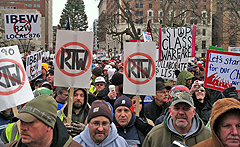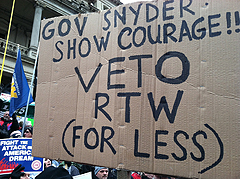December 12, 2012
War on Workers Moves to Michigan
The war on workers moved to Michigan this week when Republican Gov. Rick Snyder signed two laws that will significantly weaken unions. Snyder signed the measures on Dec. 11, just hours after they were passed by the lame-duck Republican-controlled Michigan legislature. 
The legislation was adopted at breakneck speed. Gov. Snyder and other GOP leaders announced their plan to pass “right to work” laws just five days earlier, on Dec. 6. The bills were pushed quickly through the Michigan Senate, despite an outcry from unions, other progressive organizations and Democratic lawmakers. After a required five-day waiting period — with opposition mounting — the Michigan House approved the measures. One law covers private-sector employees; the other covers public employees.
More than 13,000 union members staged a raucous protest at the capitol as the House voted, filling the rotunda area. They beat drums and chanted, with their shouts turning into a roar as state representatives voted. Snyder signed the bills behind closed doors.

Discord and Division
Democrats in Michigan’s congressional delegation had tried to dissuade Snyder from signing the laws, warning that he would be relegating the state to years of discord and division. They urged him to veto the bills, postpone them until the next legislative session, or submit them to a referendum.
“Right to work” laws are portrayed by right-wing groups as giving workers the option to refrain from joining unions, but Michigan’s Democrats told Snyder the laws were unnecessary. “They pointed out that workers are currently not required to join a union — and that they simply wanted to preserve the right of unions to collect fees from non-members to pay for wage and benefit negotiations that actually benefit them,” the Washington Post reported.
In fact, “right-to-work” laws prohibit employers and unions from signing contracts that require workers — including non-members — to pay the union for the cost of negotiating on their behalf. They allow non-members to avoid contributing financially to unions, even though all workers enjoy the benefits of collective bargaining.
Because they weaken unions, they are often called “right to work for less” laws.
“These laws are bad news for workers,” said APWU Executive Vice President Greg Bell. “They deprive unions of the leverage and financing needed to effectively represent workers. And that’s the point of the legislation.”
Paul Felton, a member of the 480-481 Area Local APWU, attended the protest at the Michigan capital. Right to work “means freedom to freeload,” he said. “It means non-members get all the benefits paid for by the loyal and hardworking dues paying members.
“It sickens me to hear Republicans claiming to be concerned about ‘giving workers a choice,’” he said. “You don’t have to outlaw union shops to give workers a choice about unions,” Felton added. “Those who object to paying union dues can choose to go work in a non-union shop for less pay.”
Labor’s House
Michigan is the 24th state to adopt right to work for less legislation, but because it is a bastion of the labor movement, the triumph of anti-union forces in the state is especially stinging.
“For millions of Michigan workers, this is no ordinary debate,” said U.S. Sen. Carl Levin (D-MI) after the vote. “It’s an assault on their right to have their elected bargaining agent negotiate their pay, benefits and working conditions, and to have all who benefit from such negotiations share in some way in the cost of obtaining them.”
Just a week before the bills were introduced Gov. Snyder said right to work legislation would be too divisive for Michigan.
So, what happened?
A well-funded political machine seems to have been instrumental in the drive to adopt the legislation. Groups with ties to the anti-union Koch family as well as to the right-wing lobbying group ALEC (American Legislative Exchange Council) apparently played a role: The Detroit Free Press pointed out that ALEC’s model right-to-work bill “mirrors the Michigan law word for word.” ALEC also authored voter suppression bills that were adopted in numerous states in the run-up to November’s elections.
Workers and other progressives vowed to seek retribution at the ballot box on those who supported the right to work for less measures.
Ezra Klein’s segment on the Michigan Vote on Rachel Maddow Show
Visit NBCNews.com for breaking news, world news, and news about the economy



